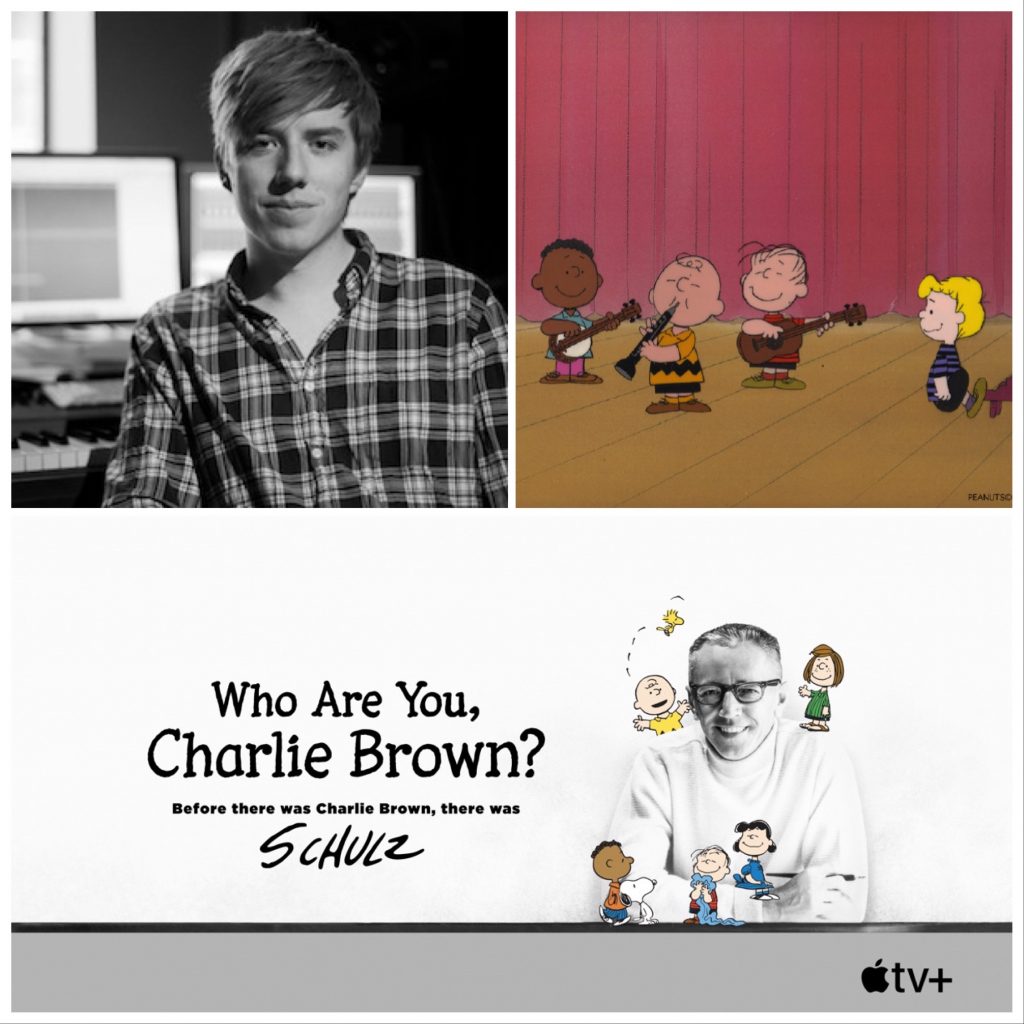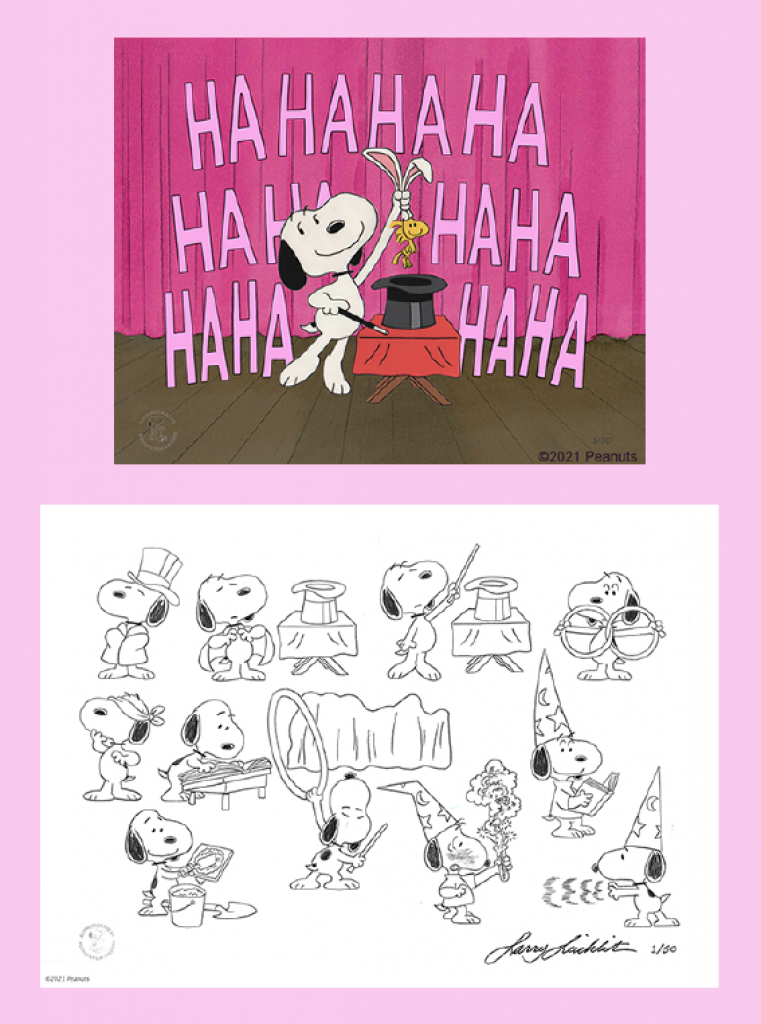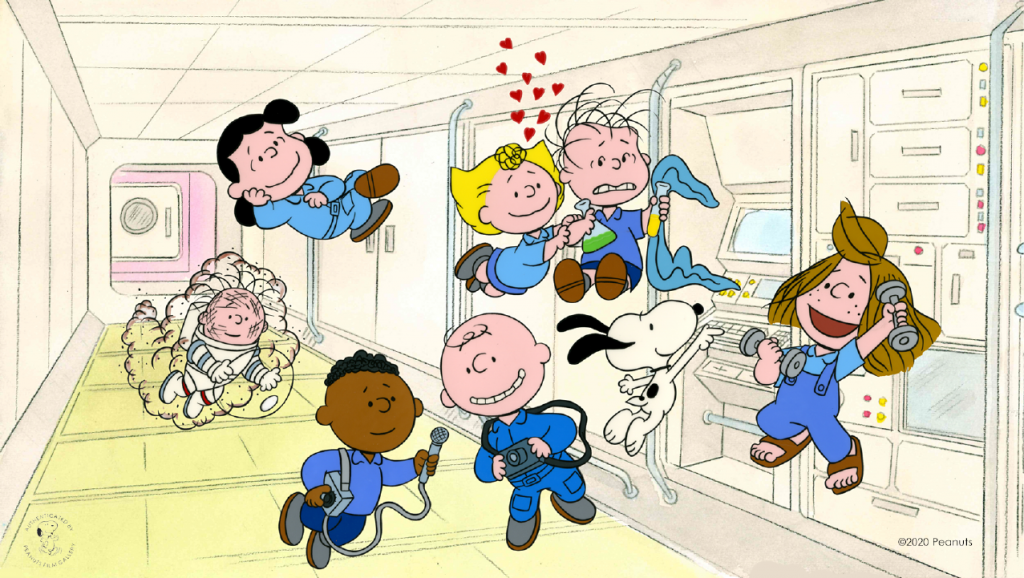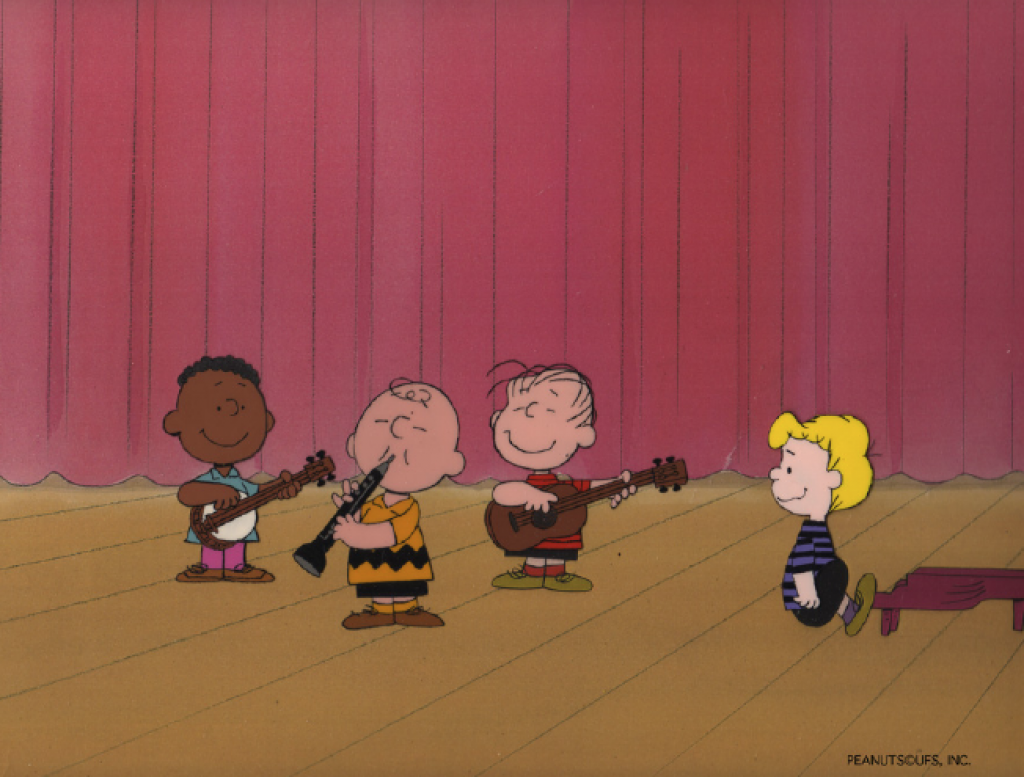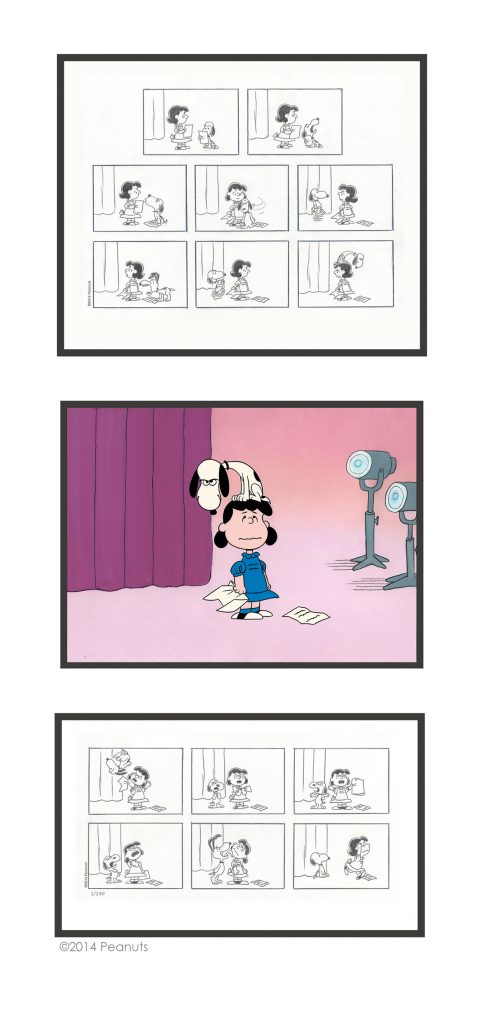There’s a ton of great Peanuts content on AppleTV+. Have you checked it out? There’s a new Snoopy show which is about to have another season, and a mocumentary on Peanuts and NASA called Snoopy in Space, and even older shows and tv specials you might not have seen. Just released is a new documentary the chronicles the life and work of Charles Schulz called Who Are You, Charlie Brown?, which is an official documentary created with the blessing of his family. Narrated by Lupita N’yong’o, it includes interviews with his wife Jean Schulz, as well as famous folks inspired by the comic strip and subsequent animated specials and shows like graphic artist and author of “Only What’s Necessary: Charles M. Schulz and the Art of Peanuts” Chip Kidd, directors Paul Feig and Kevin Smith, and tennis legend Billie Jean King.
The documentary has a score by composer Jeff Morrow, who has worked on all the new Peanuts shows and specials on AppleTV+. It’s quite an honor to have been selected to follow in the footsteps of the great Vince Guaraldi, who created the wonderful, iconic music for A Charlie Brown Christmas, among many other Peanuts scores.
Guaraldi grew up inspired by his uncles, who both headed jazz big bands in San Francisco. Early in his career, he worked with famed vibraphonist Cal Tjader before going out on his own, releasing music that would have kept him in obscurity had a DJ not played a B-side with Cast Your Fates to the Wind on it, which garnered him a Grammy Award. Peanuts producer Lee Mendelson heard Cast Your Fate while driving across the Golden Gate Bridge, and sought out Guaraldi to compose for a documentary on Peanuts called A Boy Named Charlie Brown in 1963. It was the start of a long career composing for Peanuts specials. Guaraldi’s music for A Charlie Brown Christmas in 1965, which was his 8th studio album, is consistently one of the top selling Christmas albums every year to this day, and is in both the Grammy Hall of Fame and the National Recording Registry. His last recording for a Peanuts special was for 1976’s It’s Arbor Day, Charlie Brown. Only several hours after finishing the recording, Guaraldi died suddenly of a heart attack just moments after leaving the stage of a live performance..
Following Guaraldi, composer Judy Munsen stepped in, working alongside Ed Bogas to create music for specials like What a Nightmare, Charlie Brown!, Bon Voyage, Charlie Brown, and It’s Magic, Charlie Brown. In 2000, jazz pianist and producer David Benoit released the memorial album Here’s to You, Charlie Brown, in recognition of Charles Schulz’s passing. He was involved variously in recording interpretations of Guaraldi Peanuts songs and creating music for specials. Benoit also played piano for the recent The Peanuts Movie, on a score with a mix of music by Guaraldi, and new compositions for orchestra created by Canadian composer Christophe Beck. That’s where Jeff Morrow comes in.
Morrow had been working with fellow Canadian, Emmy and Annie Award Christophe Beck, when Beck began work on The Peanuts Movie. It was through his mentorship with Beck that Morrow got the gig as the new composer for all things Peanuts. I spoke to Morrow about what inspired him to become a composer (animation fans will love knowing it involves The Lion King), how the self-ascribed music geek got into the business, and why Peanuts characters are all the inspiration he needs to create music that fits right into the discography for the iconic property.
ArtInsights: You have said you’ve always been really into film music. What scores were or are the favorites that influenced you?
Jeff Morrow: When I was really young the one that I feel like hooked me was The Lion King, by Hans Zimmer.The music is high emotion. Very dramatic. It was the first time I remember really noticing music in a film. I was nine years old. At that point in my life I was very nerdy and into classical music. I think when I was in third grade I said my favorite music was Mozart. You know that the score for The Lion King actually gets quite classical times, in the part where his father dies especially. It could be Mozart, it’s very much in that sort of vein of music.
Then as I got older, I got really into the more classic stuff for a while, like Bernard Herrmann’s North by Northwest.
The way I got into film music was, I didn’t actually grow up thinking I wanted to be a film composer, because I grew up in Toronto. I didn’t know anyone who was a film composer, so I didn’t really think of it as a thing I could do, until until much later after I had a bit of a career going as a professional musician. Being a composer, it helps that I’m just very much into all kinds of music. I was definitely, for one period of my life, a total jazz snob. Now I’m very omnivorous in what music I listen to.There’s a Duke Ellington quote where he says, “there’s only two kinds of music, good music and bad music.”
Tell me how you got involved in scoring for Peanuts in the first place, which was on The Peanuts Movie working with Christophe Beck.
I had a sort of career going in Canada, scoring kid TV shows and some TV commercials and little low budget films, short films, and features. And then, through this program at the Canadian Film Center, I met Chris down here in LA, in a meeting. We sort of hit it off and and I kept in touch with one of his assistants. Two years later I got an email saying, ‘Hey, Jeff, remember me? We need help. Do you live in LA?’ And I said, ‘No, but I can live in LA. Just give me two weeks.’ And, yeah, two weeks later, I was down here in LA. I was making coffee for Christophe for a couple of weeks, and then he asked me to write something, and he must have liked it, because from at that point on, I was co-writing with him, and ended up getting to write a bit of music for The Peanuts Movie, which was amazing. It was recorded at the Fox stage here in LA, with the 80 piece orchestra.
So how did you connect with Apple for the new Peanuts projects?
Wildbrain and Apple, this is now a number of years later, were getting together to produce all of this new peanuts content, and through Chris I was recommended for for the job. That’s basically how it happened. They asked me to demo. I got together 3 of my now-favorite musicians, but people I just met, into an incredible jazz trio, Ryan Shaw, Jordan Siegel, and Trey Henry. We got together in the studio old school, with everyone of the same room like they used to do, not all of us sectioned off in booths. Apple and Wildbrain loved the demo, and I got the job. So the first thing I did was this little mockumentary for NASA. Jeff Goldblum and Ron Howard were in it. So I thought that was it was kind of a fun way to start. Also, given that Vince Guaraldi actually started scoring Peanuts with a documentary, it seemed like perfect symmetry.
The way that you connected with Christophe Beck and stayed in touch, is that sort of similar to the way you packaged your little demo and took it to Eggplant Productions in Canada? That shows some pretty impressive determination.
Yeah, a little bit, I guess. I feel, of course, very privileged to grow up with supportive parents who encouraged me to do that kind of thing, and whatever cultural norms that suggest that I should be doing that, because I know not everyone has that sort of opportunity to get out there and be connected with some of these people. I just put together a jazz CD of my weird trombone music, googled “music production, Toronto”, and then dropped it off at a few places. The local newspaper in Canada actually did like a little piece on me getting a job there called “Cold Calls Lead to Hot Jobs”.
The first thing you must have been thinking about for Who are you, Charlie Brown? was how to work with a very famous existing music. Also, here you are creating music the story of Charles Schulz, that’s a big deal. What was your strategy from the beginning?
I knew I wanted to sort of pay homage to the sound of The Peanuts cartoons. I kind of the thought was if it was on in the other room, you would recognize it as being in the same world as what you’ve heard. The music Guiraldi wrote for the original stuff was written for kids. I don’t mean viewers, I mean, it’s written for the characters. This documentary is a story about a real life of an adult human. So it needed definitely a slightly different approach. The starting point was the instrumentation, with piano, bass and drums, but then expanded on that to include cello, flute, and clarinet, then vibes.
A number of cues start with solo bass, which is great.
Using bass is a good way to get in under people’s voices. It’s a very supportive sound. If someone’s talking and the bass comes in, you can get into a piece of music without it really announcing itself so much.
There’s definitely inspiration to be found in Guaraldi’s work.
Exactly. It’s not like Vince Guaraldi came up with this stuff in a vacuum. The reason the music sounds like it does is that he wrote it based on the characters. They’re simple kids, but there’s a profoundness to most of them. If I sat there at the piano trying to come up with the next Peanuts Guaraldi theme, it would be too much pressure. So I was mostly thinking about their characters, like Charlie Brown and Linus, and about how serious or philosophical they are. In terms of Schulz himself, he’s just such an empathetic guy, which is why his characters have so much depth to them. It becomes clear in the documentary that when he’s in the room with someone, he’s fully understanding them and picking up on characteristics from them. He’s clearly a person who notices people and takes it all in. I was just thinking about that and what, musically, could represent that?
With your jazz trio, was there a lot of improvisation on the way to creating the cues?
Always. It’s one of the great joys of working on this whole Peanuts world is working with these amazing musicians, just to let them loose on on some of the stuff. These days, working on a film, usually your computer demo is very accurate to what the final is going to be. I had to have a pact with the directors and producers the beginning. In order to get that indescribable vibe you can get from musicians in a room improvising together, it’s gonna be slightly different than what the computer demo sounds like. Thankfully, everyone’s been really receptive of that. It’s such an amazing thing to write a framework for the musicians in some of these cases, and then just watch them bring it to life. As composer, there’s this sort of knob that I turn towards improvisation and then back towards the more compositional throughout, to track the story.
You’ve said all your scores have a concept behind them. What was the concept behind Who Are You, Charlie Brown?
Well, I find especially with documentaries it’s nice to box yourself into a certain set of parameters. I find you end up with something much more interesting. It’s definitely more of a challenge for me, but that’s where it gets fun. So in the case I knew I wanted it to be this small ensemble score, and I want to be able to accomplish every emotion or feeling required within that instrumentation. The piano bass, drums, vibes, cello, flute, and clarinet, that was my limiting factor, basically. It was essentially my imagining The Peanuts band got together, invited a couple of friends, and then had to score a documentary, but those were the only tools they had. No symphony orchestra or synthesizers.
You’ve worked with Henry Jackman and Christophe Beck. What did you learn from them that you’ve taken with you and has informed your work?
What I discovered working with people like Chris and Henry, who have done this for a long time, and been very successful, is that when they get a note from a director, or producer, editor, or assistant producer, they really take it to heart. It’s actually quite impressive. If they just spent the last week working on this couple of minutes of giant symphonic music, and then someone says, ‘I don’t think that’s really working’, they have no ego about it, which is a skill that I feel requires a rewiring of your brain. You can’t just wake up one morning and be totally cool with any kind of changes people want to make to your music. It’s a skill that has to be developed over time. With them, that’s one of hundreds of different things, but as an example that’s something I learned from them. What it allows for in the creative process if that’s your perspective, going into a project, is that it’s really a collaboration.
What was your understanding or experience with Peanuts before you started composing for the property? Did you listen to the Christmas music growing up?
Of course, I listened to it every Christmas growing up, and, you know, became a jazz musician. So there’s definitely something there that inspired me in my life. That music is up there with Miles Davis Kind of Blue. It’s certainly as or maybe even more famous.
How has your perspective on the characters changed since you’ve been working on the Peanuts scores?
It’s just such a thrill and a privilege to be able to work in this world with these characters. To get to write music for them is means I get to dive into their personalities a little more. I just feel like I have a much deeper understanding of where they’re all coming from, and have empathy for them. I might have found Lucy a bit annoying as a kid. I don’t feel that way now.
Who is your favorite character?
Well I would have said Schroeder, because he’s a musician and plays piano like I did when I was a kid. I was a little bit of a Schroeder at some point as a kid, a bit snobby about music. I’m much more in the Linus camp now. I love his soliloquies and his general philosophy.
I love Franklin, and in the documentary you really learn about the impact he had on pop culture and on Black Americans who saw themselves on tv and in the comic strip.
I learned about that from watching the documentary when I was working on the score. Speaking to Schultz’s empathy, to present just a kid with no fanfare when he was introduced, which is, I think, a beautiful thing, and then he gave him huge both a humility and a realness that just placed him in the scene without fanfare but just smart, good friend. I spent a lot of time on the piece of music that goes with that segment of the documentary. , It’s a very important moment. These characters so compelling that if I’m tracking what they’re doing, and their emotions, and how they are onscreen, then it makes the job enjoyable. There’s always hair being pulled out, but it’s very enjoyable.
Are you working on anything right now?
I’m actually working on more Peanuts music, because there’s a lot more great stuff coming to AppleTV+. You and your readers will have to stay tuned because you’re going to love it!
You can watch Who are You, Charlie Brown? now on AppleTV+. The score by Jeff Morrow for Snoopy in Space is available now on Apple Music, with the score for Who are You, Charlie Brown? coming soon.

